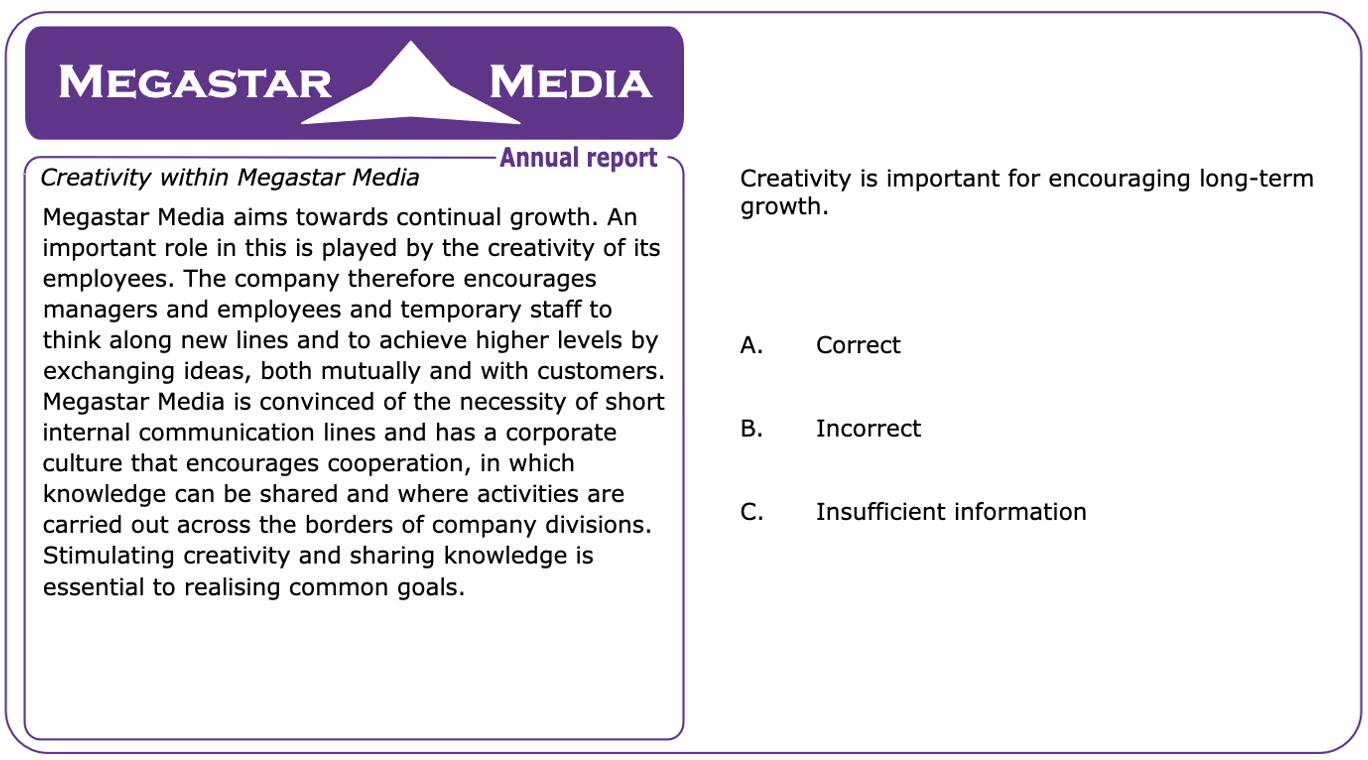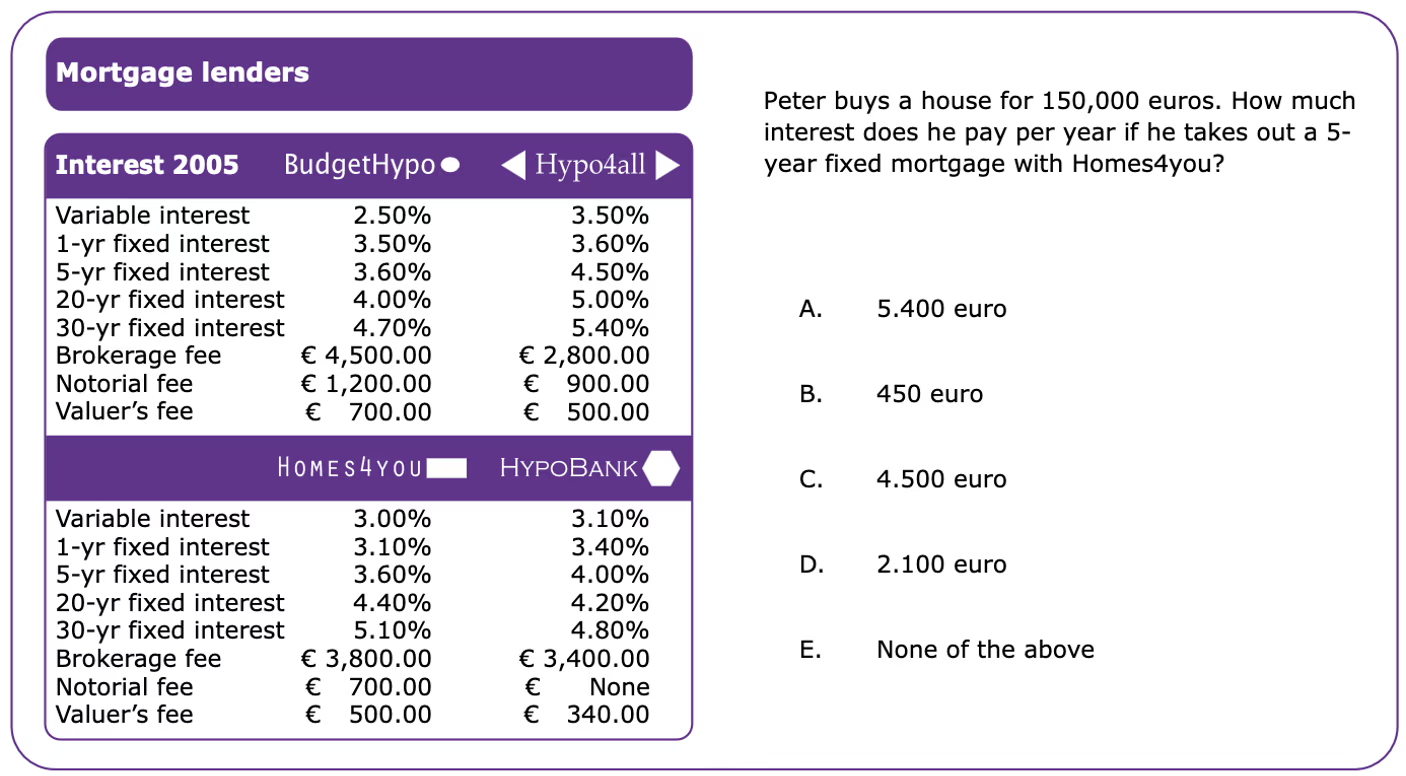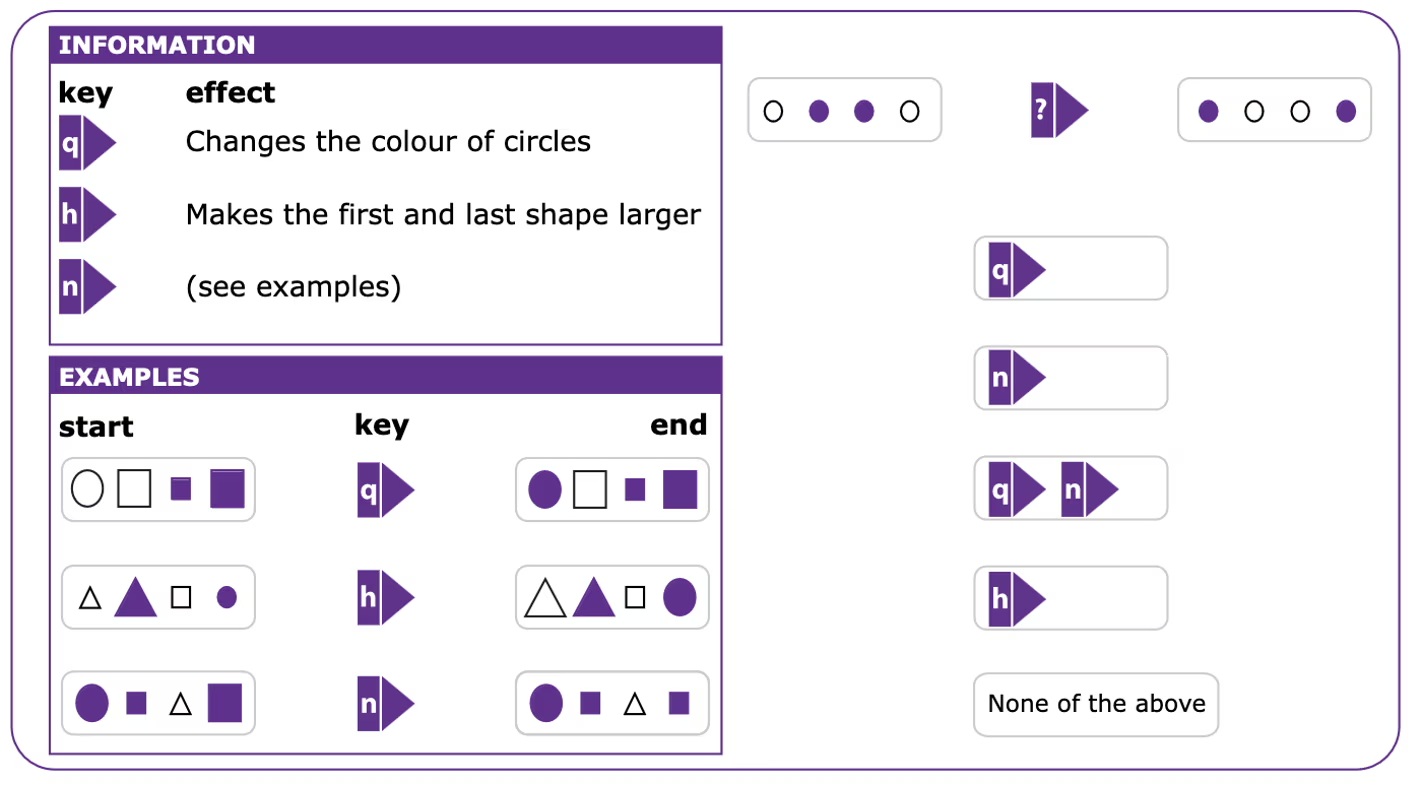Cognitive ability test for recruitment and employee selection
A cognitive ability test measures the intelligence (IQ) of job applicants or employees. The Bridge Ability Suite is the most popular cognitive ability test used by companies, organizations, and governments around the world. This test is often given during hiring or to determine if an employee can be promoted. You can order this test for each candidate or buy it through an affordable subscription.
Wat is a cognitive ability test?
A cognitive ability test assesses a candidate's problem-solving and thinking skills, focusing on numerical, verbal, and abstract reasoning. It's a strong predictor of job performance, identifying candidates with the potential to succeed in a role. Today, essential skills include problem-solving, decision-making, and clear thinking. These tests effectively measure thinking, understanding, and information usage, indicating job performance potential.
Your candidate tested today with a cognitive ability test
The Bridge Ability Suite cognitive ability test is for individuals aged 15 to 65, with education ranging from vocational to academic levels. The test measures numerical (math), verbal (language understanding), and logical thinking skills. It accurately predicts a person's ability to take on new jobs or education. It also estimates maximum performance levels and provides an indication of intelligence (IQ). Candidates can start the test within 30 minutes after ordering.
How to order the cognitive ability test
Cognitive ability test with high predictive value
This professional aptitude test is a highly effective tool for evaluating the skills and intelligence of your candidates and employees. By using this test, you can make informed selection decisions based on the candidate’s tested intelligence and potential. This cognitive ability test is useful for recruitment, selection, and other HR functions.
Features of the cognitive ability test
The Bridge Ability Suite cognitive ability test helps you find out if a candidate or employee has the skills needed for vocational, college, or university-level work. This test lets you decide if it's worth investing in education for an employee. It also helps you see if a candidate has the right skills during the hiring process.
Why this cognitive ability test?
The Bridge Ability Suite is a professional cognitive assessment consisting of three parts: The Bridge Verbal, The Bridge Numerical, and The Bridge Abstract. This test is available at vocational, college, and university levels. You can order this test individually (per candidate) or through your own account on the Bridge Assessment Platform.
Sample report: cognitive ability test
You can view a sample report of the numerical cognitive ability test at the college level here. Tests are available at vocational and university/master levels. The report only shows the results of the numerical part of the IQ test. Separate reports for the verbal and abstract cognitive ability tests are also available. The report displays the overall score and includes scores for accuracy, speed, and efficiency. It also notes if the person guessed during the test.
Cognitive ability test: Verbal reasoning
Do you want to know how well candidates understand and analyze complex texts? The verbal cognitive ability test measures the ability to draw the correct conclusions from written information. Additionally, this cognitive ability test provides insights into the following sub-areas: vocabulary comprehension, text comprehension, and understanding arguments.

Cognitive ability test: Numerical reasoning
Are you looking for a reliable online test that measures numerical skills? In this numerical reasoning test, candidates must, among other things, perform calculations and compare data and tables.

Cognitive ability test: Logical reasoning (abstract)
Do you want to know if candidates are suitable for financial, technical, or scientific roles? Within thirty minutes, this logical reasoning test measures the ability to think strategically, analyze processes, and understand and process numbers.

Cognitive ability tests are often used together with a 16 personality test, a Big Five personality test, a Jung Personality test, a competency test or a 4-color personality test.
Is a cognitive ability test equivalent to an IQ test?
Partially, yes. "IQ" usually measures general intelligence. It shows how well someone can understand concepts and solve problems. While IQ tests and cognitive ability tests seem similar, "IQ" (Intelligence Quotient) specifically refers to your score on a cognitive test compared to the average score in your country. In the past, scores were compared by age. Now, they are based on standard deviations from the median score. Essentially, IQ reflects one part of cognitive ability. Common tests include the Wechsler Adult Intelligence Scale (WAIS) and newer versions of the Stanford-Binet test. However, using IQ tests for hiring is old-fashioned. Today, best practices suggest using cognitive ability tests instead.
Why should recruiters opt for cognitive ability tests in hiring?
Finding the right candidate is often difficult, but recruiters can use tools to improve the hiring process. Cognitive ability tests are effective in hiring, though they are not used as much as they should be. Here are seven strong reasons to start using cognitive ability tests right away:
1. Job performance prediction
One of the strongest arguments for cognitive tests is their ability to predict job performance. For example, a 1998 study by Frank L. Schmidt examined 19 different employee selection methods for their predictive power. These methods included education level, work experience, structured and unstructured interviews, job knowledge tests, and cognitive ability tests. Schmidt found that cognitive ability was the most significant predictor of job performance.
2. Assessing learning and problem-solving skills
Cognitive tests reliably predict job performance by measuring candidates' adaptability in evolving work environments. Job success depends more on learning speed than on existing knowledge. Employees with higher cognitive abilities learn faster, adapt quickly, and solve novel problems efficiently. In essence, cognitive ability tests predict learning and problem-solving skills.
3. Uncovering hidden potential
Resumes highlight past achievements, but they may not show a person's future potential. Cognitive ability tests can help identify candidates with great potential, even if their resumes are not extensive. This approach is especially useful for hiring entry-level positions where there are few experienced applicants. By investing in fast learners, organizations can build a skilled workforce at all levels.
4. Time and cost efficiency
Cognitive assessments are as effective as structured interviews in predicting job performance. Research by Schmidt showed that cognitive tests are the most cost-effective way to hire. They make the pre-screening process faster, saving both time and resources.
5. Reducing bias
Reducing and removing bias in hiring is essential for every recruiter. Cognitive tests help make the hiring process more objective. However, even recruiters who want to provide equal opportunities can have unconscious biases about intelligence, which can lead to unfair treatment of candidates. Cognitive ability tests allow recruiters to measure intelligence based on merit. This standardizes hiring and helps reduce unconscious biases.
6. Candidate attraction
A thorough vetting process shows that a company is committed to hiring the right people. It values skills and potential over other factors. This approach signals to candidates that the company is modern, focused on fair hiring, and has clear goals. By using a cognitive ability test and thoughtful questions, the company can assess skills and offer insight into its culture. This improves the candidate experience and helps attract the right talent.
7. Enhance employee retention
Cognitive ability tests help keep employees by attracting the right candidates. Employee retention is an important goal for HR teams. Replacing a staff member can cost between half to twice their annual salary, according to Gallup. This high cost includes expenses for advertising, interviews, screening, onboarding, training, management time, reduced productivity, lower engagement, customer service issues, mistakes, ongoing training costs, and impacts on company culture. Gallup also reports that employee turnover costs American businesses a trillion dollars each year, much of which can be avoided with the right steps. Using cognitive ability tests is important for your retention strategy.
Sample reports: The Bridge Ability Suite
There are three reports available for The Bridge Ability Suite: the Bridge Abstract report, the Bridge Numerical report, and the Bridge Verbal report.
Sample Report: The Bridge Abstract
Sample Report: The Bridge Numerical
Sample Report: The Bridge Verbal
Video: how to use a cognitive ability test
A cognitive ability test, or IQ test, is the best predictor of job performance. The Bridge Ability Suite is one of the most widely used cognitive ability tests by companies and organizations worldwide. Through the use of "item-bank technology," each participant gets different questions during testing. This way, cheating is impossible. You can order The Bridge Ability Suite per candidate or use it in your own account on the Bridge Assessment Platform.
-
What norms are available for The Bridge Ability Suite cognitive ability test?
-
A proper cognitive ability test, such as The Bridge Ability Suite, utilizes a norm group. A norm group consists of 500 individuals (n=500) who have previously completed this cognitive ability test. There are norms for vocational (MBO), higher professional (HBO), and university-level (WO/University) education.
-
How do you prepare for a cognitive ability test?
-
A candidate, employee, or applicant can prepare for a cognitive ability test by practicing. For this purpose, many tests can be found online, but there are also practice books available, such as the book on cognitive ability tests by Wim Bloemers.
-
Can this cognitive ability test also be completed at home?
-
The Bridge Ability Suite cognitive ability test can also be completed at home. This cognitive ability test uses 'item-bank' technology, which means that each candidate receives different questions. As a result, 'cheating' or looking up answers to test questions is impossible.
-
How can I order these cognitive ability tests?
-
You can order a cognitive ability test in three ways: by ordering a single test, using credits, or by subscribing for unlimited use. The more tests you take, the cheaper it becomes, of course. Those who subscribe also receive additional benefits, such as the immediate receipt of reports.
-
What types of reports are available?
-
There are three different reports available for the cognitive ability test. We have an Abstract, Numerical, and Verbal report. These are three different ways to get to know your staff or to screen new candidates during the recruitment process.
-
Is training required to administer the cognitive ability test?
-
Training is not mandatory to administer the test. Additionally, TestGroup's consultants are always available for questions and can go through the reports with you over the phone or a video-call.
-
For which levels are the cognitive ability tests available?
-
The cognitive ability test is available for three different levels, namely vocational (MBO), higher professional (HBO), and university (WO). This way, you can test staff members and applicants with various educational backgrounds.
-
For whom are the cognitive ability tests available?
-
Our cognitive ability tests are available only for businesses and organizations. Individuals cannot order these tests.
-
Why should I use a cognitive ability test during selection?
-
Because scientific research indicates that a cognitive ability test is the best selection tool available. The cognitive ability or intelligence of your candidate are a good predictor of future work behavior. Of course, whether a cognitive ability test is a suitable selection tool depends on the job function.